Practice to Deceive Read online
Page 3
Her words continued to burst out, almost as if she was trying to delay learning whatever the two detectives were there to tell her. Even so, she had little positive to say about Russel. She said they were separated because Russel had had a couple of affairs, one of them homosexual.
“I just couldn’t accept his deviant lifestyle,” Brenna said.
According to his wife, Russel Douglas had been cruel and brutally open about sharing that lifestyle with her. She knew about an older woman who lived in Tacoma, Washington, twenty-six miles south of Seattle.
“Her first name is Fran* and she’s around fifty years old. I think she works for a telecom company. Russel sometimes tries to tell me about how he parties and has sex with her. I think he does that just to get to me . . .”
“Where do you think he is now?” Birchfield asked. “What do you think has happened to him?”
“I don’t know. I talked to him on Christmas Day and he told me he had a promotion at work. He was happy about that.
“I talked to his sister, Holly Hunziker, the next day; she lives in Everett. She and I are good friends, and I wanted to take her a birthday present because her birthday’s so close to Christmas, and she kind of gets left out. She said she was going out, so we just spoke on the phone. Then the kids and I went shopping and to see a movie—Hook.”
Still, Brenna Douglas didn’t ask why they were there close to 11 P.M., wanting to talk about her husband.
Mike Birchfield asked about Russel’s friends and who his doctor was. She said she didn’t know. She had no idea who his friends were. He might have friends at his job, but she didn’t know any of them. If he knew anyone on Whidbey Island, he would have had to meet them through her. She stressed that point over and over. Russel had no friends on the island unless it was someone he might have met because she had many friends.
“Are you surprised that we’re here tonight?” Birchfield finally asked bluntly.
“Yes . . . and no. I don’t know where he is. He just came back into my life a couple of weeks ago.”
Brenna didn’t seem to be very happy about that. She described Russel as very controlling, a man who cheated on her callously and mentally “abused” her.
“Is he physically abusive?”
“Not so much, but he does—did—some pushing.”
“Does Russel own any firearms?”
“A .22 rifle, and some knives,” she said. “No handguns.”
“Do you own any guns?”
Brenna Douglas didn’t blink or seem frightened by this line of questioning. “I have a .22 caliber pistol.”
“Could we see it?”
She walked to her bedroom and came back with the pistol. She explained that her home had been burglarized recently, and she thought it might have been Russel who broke in. She didn’t say why she thought that.
“My stepfather gave me this gun after that happened. I only fired it once.”
The two detectives exchanged a glance. They had been in the house for almost half an hour, and Brenna had yet to ask them why they were there, or why they were asking about her husband.
Her behavior wasn’t as uncommon as it might seem on the surface; some people, dreading terrible news, try to stall because they don’t want to know. Brenna was placid, even stoic. As much as she denigrated her husband, he was the father of her children, and she had allowed him to stay with her over Christmas. It was even possible they had been partially reconciled.
“Do you know why we’re here, Brenna?” Birchfield asked quietly.
“No—not really.”
“Russel was found dead in his car this afternoon.”
“Oh . . .”
That was all she said. Was she in shock? They waited, but she didn’t ask why her husband was dead, how he died, or where he was when he died. She seemed so composed that she was almost aloof.
Or was she stunned into silence, shocked to her core?
While Mike Birchfield continued to question the new widow for another five minutes or so, asking about the couple’s relationship, Russel’s lifestyle—even touching on his sexual habits—Brenna answered woodenly.
But she still didn’t ask how her husband had been killed, so Birchfield kept talking.
“He was shot in the head.”
Brenna sat like stone, completely void of reaction. Was she in deep shock?
Or was she not surprised?
Now she began to speak, breathlessly running one sentence into another. She certainly didn’t avoid speaking ill of the dead. Brenna repeated that Russel had “rubbed in her face” his clubbing, partying, and cheating. She thought he might be a sadomasochist, although she said he had never tried anything like that with her.
“I just couldn’t accept his sexual ideas—he thought whatever he saw on the Internet was ‘normal.’ ”
“Did you ever participate in any of those sexual activities?”
“No!”
“Why do you think he wanted to get back together with you?”
“Control. He liked to play control games with me. Like on Thanksgiving. He was supposed to meet me at the ferry about seven in the morning. But he didn’t show up. I finally called him at ten thirty and he was just then leaving Tacoma. He did things like that as his way of controlling me.”
“Did he build you up and then let you down when he treated you bad?”
“Yes.”
“How did that make you feel?”
“Sad.”
“Did he ever make you angry?”
“Yes! When he treated me bad.”
When Mike Birchfield asked her if she thought Russel Douglas had mental problems, she nodded. Now she recalled the names of two counselors he had been seeing.
Once again, Brenna stated that Russel had “run off before,” only to come back and try to get her to make their relationship work.
“Russel started divorce papers but he never went ahead with them,” she said
“Why didn’t you file for divorce?”
“I guess I was hoping we could work it out. Russel and I have owned Just B’s salon in Langley for about a year. Our business is pretty successful. I’m the one who works there, but he was going to do our taxes this year.”
“Do you know where his current address is?”
“No—but I know how to get to his apartment. I know he runs—ran—and went to Gold’s Gym that’s near his apartment. He used to work out at Ken’s Korner in Clinton about eight years ago—when we were first married.”
But Brenna added that Russel wasn’t exactly a health freak—he drank a lot. It was very common for him to get drunk.
“Drugs?” Birchfield asked.
“I don’t know.”
Mark Plumberg asked Brenna about the note he’d seen near the front door.
“I wrote it this morning. He’s been staying here since Christmas Eve. I left him a note that me and the kids were going off-island. We took the one o’clock ferry to Mukilteo.”
At that point, Brenna’s phone rang. She left the room to answer it. When she came back, she explained that two of her friends—sisters—had called, and that they often called her late at night because it was a good time to talk after her children went to sleep.
Within about fifteen minutes, the two women arrived at her door to comfort Brenna in her loss.
Mike Birchfield asked her if she would be willing to come to the precinct office in Coupeville the next day for a further interview.
Finally, she looked stricken. “What do I do?” she asked. “What do I do with his family?”
There was no way to answer that. Birchfield studied her face before he commented casually that she hadn’t been very emotional or surprised when he told her that her husband—albeit an estranged husband—was dead.
“Why is that?”
Brenna sighed. “When my mom died, Russel told me I was not allowed to cry. Now, I guess I’ve learned to just suppress my emotions.”
“Do you know what your husband had in his car?” Mark
Plumberg asked.
“Tons of stuff—sleds for the kids, files from his work, some clothes.”
“Have you been in his vehicle since he arrived here on Christmas Eve?”
She nodded. “I drove it to the Star Store on Christmas Day to buy some pies, and then Russel drove me to our salon so I could hide a key for one of my girls to open the shop the day after Christmas.”
“When your husband left here on the twenty-sixth,” Mike Birchfield began, “what did he do—or say?”
“It was about a quarter to eleven. He kissed me and the kids, and he said he’d be back in a few hours. He said he had to get some things done.
“But he never came back.”
It was late, and it seemed wise to end this first interview. Mike Birchfield and Mark Plumberg had many more questions they wanted to ask Brenna Douglas, but they could wait until morning.
As they left, one of Brenna’s friends asked if she should bring an attorney with her for the next day’s interview.
“That’s up to her,” Birchfield answered.
This was the beginning of one of the most challenging investigations the Island County Sheriff’s Office and the Island County Prosecuting Attorney’s Office had ever faced. It was not what it seemed to be; just when they pieced together part of the deadly foundation of a murder case, it would tear loose of another section. Their probe would involve Oregon, Idaho, Nevada, New Mexico, Florida, Texas, Alaska, and Mexico.
And it would take years.
CHAPTER FOUR
* * *
THE ONE PERSON A homicide investigator needs to interview the most is forever out of reach. The victim can no longer speak, and yet superior detectives find ways to know that person more thoroughly than anyone they know in life. They must weigh everything they learn about the dead, balancing what one witness says against what other witnesses assure them is the truth. At times, when the victim has lived an uncomplicated life, that can be a fairly simple exercise. With someone like Russel Douglas, the challenge from the beginning was overwhelming.
Beyond losing their very lives, homicide victims lose their privacy. Their hopes, dreams, flaws, sins, accomplishments—everything—become public knowledge. In a sense, their very innards are spread out for public viewing to be picked over, criticized, and exploited. The media does that, of course, and detectives have to explore every facet of the dead person’s life if they hope to find who might have had a motive, opportunity, or means to destroy him—or her.
Who was Russel Douglas? His semi-estranged wife had made him sound monstrous even as she learned he was dead—murdered.
But that was only one person’s opinion. Russel did have friends, coworkers, even a lover who would speak positively about him.
Mark Plumberg and Mike Birchfield had to examine physical evidence and study forensic results. They also had to seek out dozens of people whose paths had crossed Douglas’s.
As they returned to 6665 Wahl Road the next morning, they found that daylight wasn’t going to reveal much. The gun simply wasn’t there, nor was there any other ballistic evidence. There were some tire marks in the soft dirt of the driveway that indicated that a vehicle had turned around near the cottage. But the details of the tires were blurred, not nearly distinctive enough to compare to exemplars of other tire imprints.
By noon, Plumberg and Birchfield met Brenna Douglas in the South Precinct office for a second interview. She brought Russel’s “work computer,” a laptop, with her. They learned that he was employed by the Tetra Tech Corporation, near Redmond. He was a zone manager and was highly skilled with computers. Brenna said he was working toward his master’s degree in the University of Phoenix’s distance education program, and had an email account with the school, along with several other accounts.
Indeed, he was within only a few credits before he got his MA.
Mark Plumberg interviewed Brenna in one room, while Mike Birchfield talked to Russel’s sister, Holly Hunziker, in another.
Plumberg asked Brenna if she had thought of anything since they last talked that might help the investigation. She mentioned that some of her clients at Just B’s had told her they had seen her husband a few times on the ferry as it docked at Whidbey.
“That was odd, because during some of those times, he didn’t come to see me—or our children. I don’t know who he was meeting.”
For some reason, Brenna had concluded that Russ might be having a homosexual affair with some man on the island.
It wasn’t long before Brenna began talking again about Russel’s lifestyle. She was convinced he was into “swinging” and bizarre sexual exploration. She had seen his body piercings, and said he even had his nipples pierced.
“He wanted to get more piercings, but I just could not deal with that!”
She spoke in an oddly matter-of-fact manner. Nevertheless, she had let Russel back into her life in the past few weeks to see if he had changed. She didn’t really want him back, and she said she had discussed it with their very young children, and they didn’t want him living with them, either.
“We were doing very well since he left us last May.”
Mark Plumberg noticed how relaxed and comfortable the recent widow appeared to be. She sipped from a cup of coffee she’d brought with her. She was almost inappropriately animated as he talked to her.
It seemed that she could not say enough bad things about the man who had been found dead less than twenty-four hours earlier. Brenna repeated that she thought he was having an affair with a man she named. Her suspicions had been fueled by pornography she found on his computer in September.
“For Christmas, do you know what he gave me? Lingerie, flavored condoms, and a sex swing! We agreed to take it slow, and I asked him if that was his idea of ‘slow.’ ”
Plumberg asked her if Russel had tried to get her to engage in any unusual sex since he’d been home for Christmas, and she shook her head.
“No, he’s been on his best behavior. We did have very protected sex. I guess I just wanted to feel loved.”
Brenna was a study in ambivalence. One minute she characterized her late husband as gay, and the next she talked about his lust for her and other women.
More confusing, the Christmas she described sounded like any happy family’s, although Russel was a “little upset” because she changed their usual Christmas morning. He had wanted their children to wait while he had breakfast before they opened their presents.
“I told him that now the kids were coming first, and he could just wait for his breakfast.”
Brenna’s stepfather, who had been widowed a year earlier, came over to have dinner with them and left between five and six. Then Russel had played Xbox with Jack, while she and Hannah watched a movie in her room.
“Russel came into my bedroom later and we watched Bad Boys II and then we went to sleep.”
On December 26, she had stayed at home after Russel left, although she was upset because she had wanted to go to the “eye doctor.” She had called Russel’s cell phone a few times to see where he was, but he didn’t answer.
“Were you worried about your husband?” Plumberg asked.
“A little—because we hadn’t been fighting or anything so I didn’t know why he wouldn’t come back. Then I got mad because I thought he was back to his ‘old routine’ of only being concerned about himself.”
With no word from him, she had gone to the mainland—as she said before—eaten at the Red Robin restaurant, shopped at Penney’s and some “video game place,” and then gone to the movie. She had receipts and ticket stubs that verified this.
Brenna Douglas’s description of Russel’s alleged “abuse” indicated that it was more verbal than physical. He had taken their children to visit his lover, Fran, at Thanksgiving and unplugged the phone there so she couldn’t talk to them.
“He never went places with me. Oh, once we went to a game and there were these two women sitting in front of us. I simply commented about how ‘trashy’ they were dressed, and
he turned on me and in a real loud voice, he said I was just jealous because I was the ‘fattest woman in a stadium of thirty thousand people!’ ”
Brenna’s complaints might have been justified in other circumstances, but they sounded weak and selfish when compared to the unsolved homicide of her husband who had a bullet in his brain.
She was a big woman, but in an attractive, buxom way, and she was also pretty with long, luxuriant hair. And there was no way she could have been the “fattest woman” in the stadium. She appeared somehow stronger than the photos Plumberg had seen of Russel Douglas. In a physical fight—if, indeed, they ever engaged in one—Brenna would have had a good chance of winning.
Plumberg tried again to get any information Brenna might have on who hated Russel enough to kill him. Was there anyone he seemed afraid of?
She had no idea. Then she remembered that he had told her about a man who was a “headhunter” who was looking for him the week before Christmas. She hadn’t known what a headhunter was until Russel told her they were people who tried to steal employees away from other companies and offer them jobs.
“This guy told Russel he would have to sign a secrecy thing. They had to meet at night and no one was supposed to know. We were having dinner at his mother’s house just before Christmas when he said that. Gail will remember that, too.”
Gail O’Neal, Russ’s mother, did recall a discussion about a “headhunter.” That holiday dinner in 2003 was the last time she saw her son alive.
Brenna seemed to be on good terms with her mother-in-law, even though Russel had told any number of people that he disliked his mother because of the strict and punitive way she had raised him.
Asked about that later, Gail O’Neal, who has a PhD in nursing and teaches at Washington State University, nodded. She knew that Russ had blamed her for some of his misfortunes.
“He always blamed someone else for the unhappiness in his life,” she said. “He was a grown man and he was still complaining that he had a miserable childhood. He felt he had missed out on so much in his life, and he looked for someone he could hold responsible.”

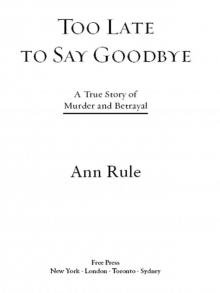 Too Late to Say Goodbye: A True Story of Murder and Betrayal
Too Late to Say Goodbye: A True Story of Murder and Betrayal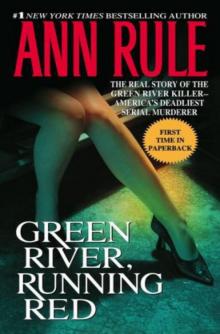 Green River, Running Red
Green River, Running Red Bitter Harvest
Bitter Harvest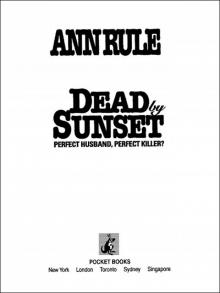 Dead by Sunset: Perfect Husband, Perfect Killer?
Dead by Sunset: Perfect Husband, Perfect Killer?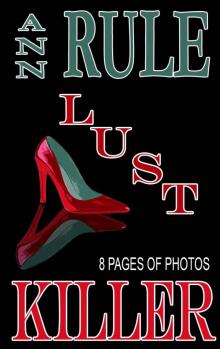 Lust Killer
Lust Killer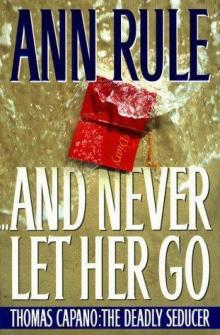 And Never Let Her Go: Thomas Capano: The Deadly Seducer
And Never Let Her Go: Thomas Capano: The Deadly Seducer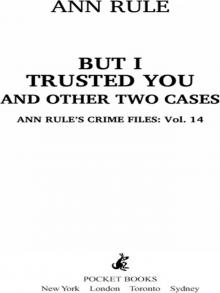 But I Trusted You and Other True Cases
But I Trusted You and Other True Cases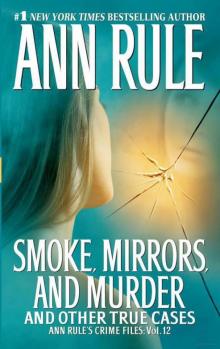 Smoke, Mirrors, and Murder and Other True Cases
Smoke, Mirrors, and Murder and Other True Cases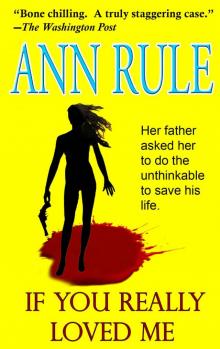 If You Really Loved Me
If You Really Loved Me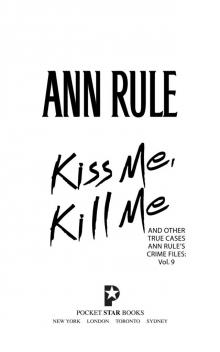 Kiss Me, Kill Me and Other True Cases
Kiss Me, Kill Me and Other True Cases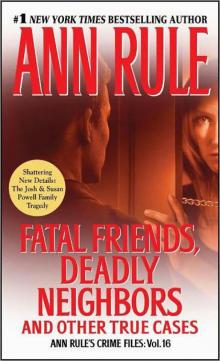 Fatal Friends, Deadly Neighbors and Other True Cases
Fatal Friends, Deadly Neighbors and Other True Cases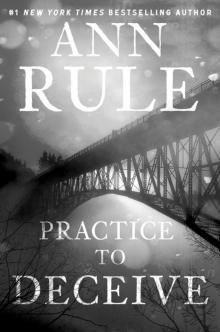 Practice to Deceive
Practice to Deceive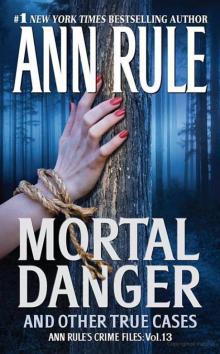 Mortal Danger and Other True Cases
Mortal Danger and Other True Cases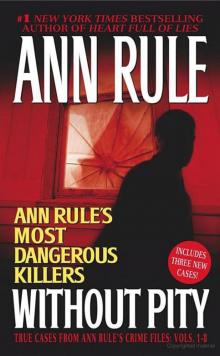 Without Pity: Ann Rule's Most Dangerous Killers
Without Pity: Ann Rule's Most Dangerous Killers Everything She Ever Wanted
Everything She Ever Wanted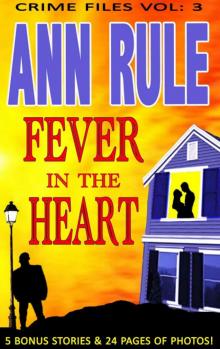 A Fever in the Heart and Other True Cases
A Fever in the Heart and Other True Cases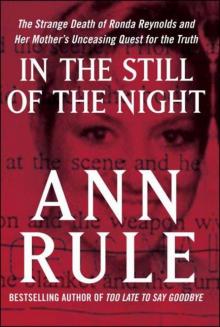 In the Still of the Night
In the Still of the Night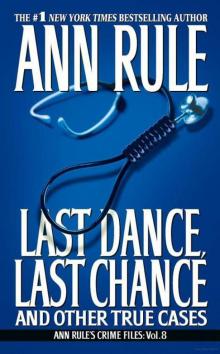 LAST DANCE, LAST CHANCE - and Other True Cases
LAST DANCE, LAST CHANCE - and Other True Cases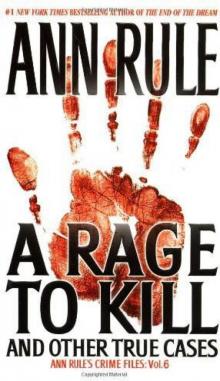 A Rage to Kill
A Rage to Kill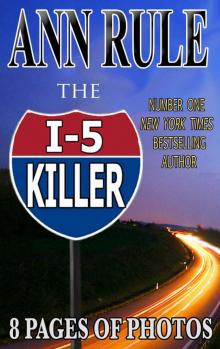 The I-5 Killer
The I-5 Killer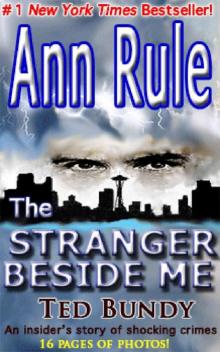 The Stranger Beside Me
The Stranger Beside Me Everything She Ever Wanted: A True Story of Obsessive Love, Murder, and Betrayal
Everything She Ever Wanted: A True Story of Obsessive Love, Murder, and Betrayal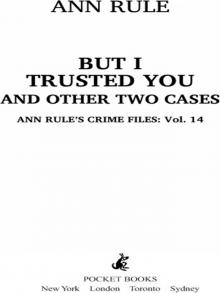 But I Trusted You
But I Trusted You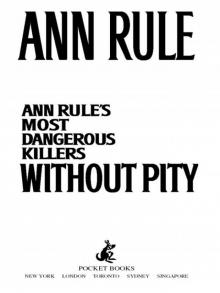 Without Pity
Without Pity Kiss Me, Kill Me
Kiss Me, Kill Me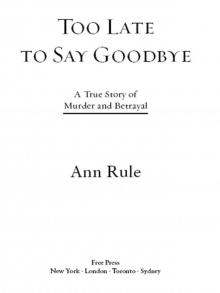 Too Late to Say Goodbye
Too Late to Say Goodbye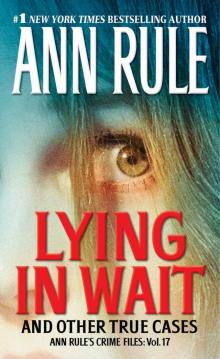 Lying in Wait
Lying in Wait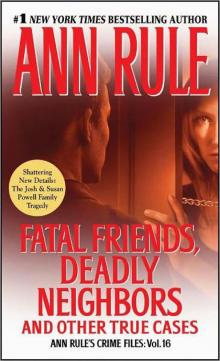 Fatal Friends, Deadly Neighbors
Fatal Friends, Deadly Neighbors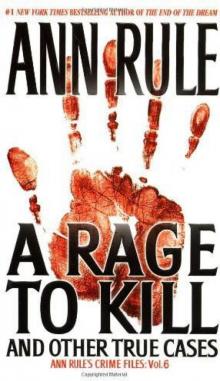 A Rage to Kill: And Other True Cases
A Rage to Kill: And Other True Cases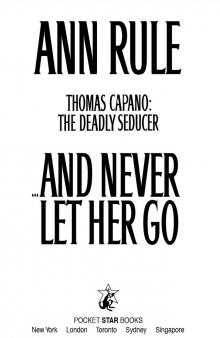 And Never Let Her Go
And Never Let Her Go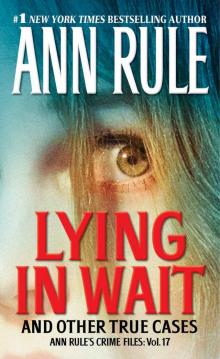 Lying in Wait Ann Rule's Crime Files Vol.17
Lying in Wait Ann Rule's Crime Files Vol.17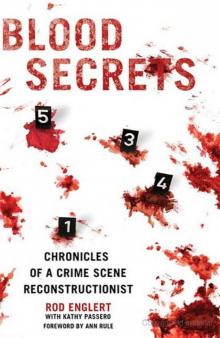 Blood Secrets: Chronicles of a Crime Scene Reconstructionist
Blood Secrets: Chronicles of a Crime Scene Reconstructionist No Regrets
No Regrets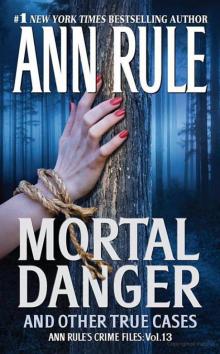 Mortal Danger
Mortal Danger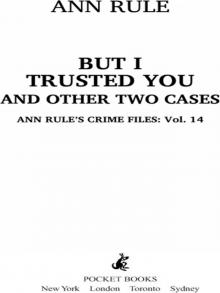 But I Trusted You: Ann Rule's Crime Files #14
But I Trusted You: Ann Rule's Crime Files #14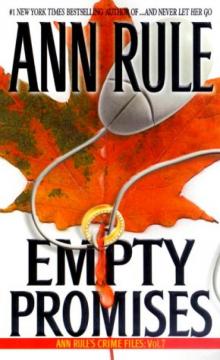 Empty Promises
Empty Promises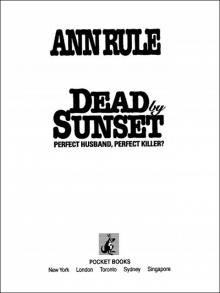 Dead by Sunset
Dead by Sunset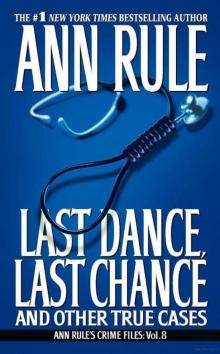 Last Dance, Last Chance
Last Dance, Last Chance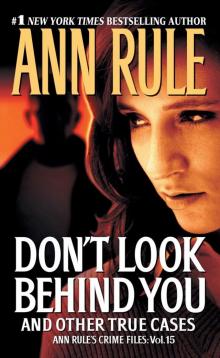 Don't Look Behind You
Don't Look Behind You